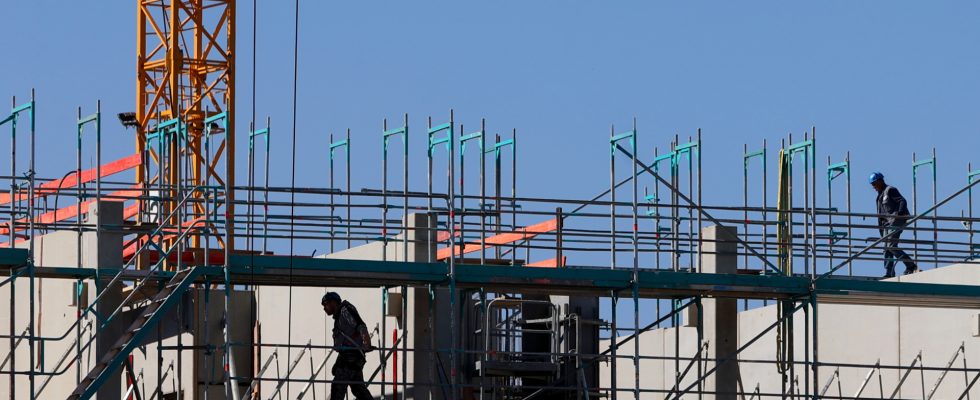As of: 04/20/2023 6:41 p.m
Representatives of the construction industry warn of a crisis in housing construction. If politicians don’t take countermeasures, there is a risk for society – and a downward spiral in construction activity as a whole.
Hardly any other goal of the traffic light government is as far off as building 400,000 new homes every year. Last year the number was probably just 280,000, for this year industry representatives estimate a further decline to 240-250,000. And not only the number of completed apartments is falling. The number of building permits is also decreasing. After all, projects that have already been approved are canceled more frequently, as the Ifo Institute reports shortly before the start of the housing construction day in Berlin.
At the same time, the decline in new construction is offset by higher demand. With the influx of more than a million refugees last year, the need for affordable housing is higher than ever, says Robert Feiger, head of the industrial union BAU. And Feiger warns: “The lack of affordable housing is developing into a danger for society.”
Is the construction industry threatened with a negative spiral?
The construction industry may even be threatened with a negative spiral, which it experienced in the 1990s. At that time, after the reunification boom, there was a dramatic decline with large job losses – a decline from which the industry was only able to recover slowly. Feiger fears the same thing today: If young people see no future in construction or – as is already the case in some trades – short-time work has to be ordered, there is a risk of workers migrating to other sectors. Housing construction is at a dangerous tipping point.
Against this background, Christian Staub from the Central Association of the German Construction Industry sounds the alarm: an “increase in funding levels” is urgently needed. The federal government should spend a further 50 billion euros on social housing alone. The alliance of business associations, trade unions and tenants’ association could imagine a new special fund for this. However, this raises concerns with Minister of Construction Klara Geywitz (SPD): “The special fund sounds like a chunk of money – but in reality it’s a chunk of debt.” And the possibilities for debt are limited – “with all due respect for the demand”.
Habeck: Politics cannot “cheap everything and everywhere”
Economics Minister Robert Habeck (Greens) also does not give the industry representatives a firm commitment at the Housing Day. It is part of honesty to admit that politicians “cannot cheapen everything and everywhere”. However, politicians can provide targeted support in the social and ecological area – within the framework that the economy can bear. According to Habeck, it is therefore necessary to examine how existing and possibly saved funds could be used in a targeted manner for the construction industry.
The minister expresses sympathy for the considerations of the SPD parliamentary group leader Rolf Mützenich, who had brought into play a reallocation of debts from the economic stabilization fund for other tasks of the state. After all, the construction industry is a “pillar of the transformation policy”.
Construction industry complains about rising costs due to requirements
Opposition politicians like Mario Czaja (CDU), on the other hand, accuse the government of having aggravated the misery in construction itself. Many people are unsettled because two questions have not been clarified: “The first question is: What can I expect? The second: What support will I get?” This applies in particular to the energy requirements in the building sector – keyword heating.
The representatives of the construction industry also see a major problem here. The construction costs have not only increased due to the higher prices for building materials or higher interest rates, but also due to the ever stricter requirements – at all political levels: from parking spaces to the design of outdoor facilities to the requirements for energy efficiency. Axel Gedaschko from the Association of Housing and Real Estate Companies states soberly: “We’re running out of money for all these measures that are now being demanded of us, that’s the reality.” The result is cancellations
Minister of Construction Geywitz also recognizes the problem of more and more regulations that make construction more expensive. She agreed to take a critical look at the construction requirements. She will “thoroughly shake out” the building code for this – in the coming year there will be a major reform.
Construction industry warns of a tipping point on the housing market
Hans-Joachim Vieweger, ARD Berlin, April 20, 2023 6:08 p.m

